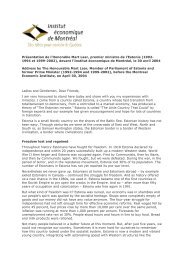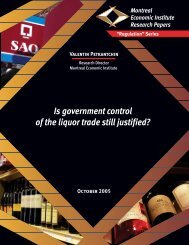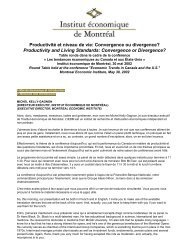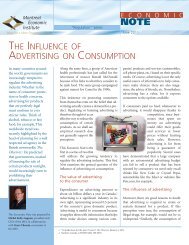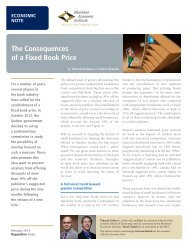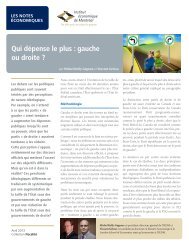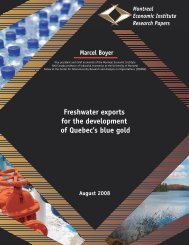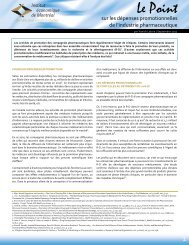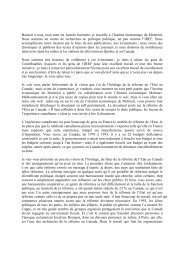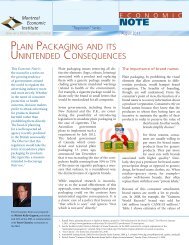Publication (PDF format) - Institut économique de Montréal
Publication (PDF format) - Institut économique de Montréal
Publication (PDF format) - Institut économique de Montréal
Create successful ePaper yourself
Turn your PDF publications into a flip-book with our unique Google optimized e-Paper software.
Why New International Taxes for Development Are InefficientCHAPTER 1IFD and IFD Taxes1.1 What is IFD?Clearly <strong>de</strong>fining Innovative Financing forDevelopment, or IFD, is not easy. An illustrationof this difficulty is given by a <strong>de</strong>finition from theWorld Bank:Innovative financing involves non-traditionalapplications of solidarity, PPPs, and catalyticmechanisms that (i) support fundraising bytapping new sources and engaging investorsbeyond the financial dimension of transactions,as partners and stakehol<strong>de</strong>rs in <strong>de</strong>velopment;or (ii) <strong>de</strong>liver financial solutions to<strong>de</strong>velopment problems on the ground. 1Like this one, many <strong>de</strong>finitions are obscure. It iseasier to see what IFD is from its history.IFD <strong>de</strong>veloped over the last dozen years froma vague concept into a complex set of projects andfinancing instruments. The i<strong>de</strong>a of finding newforms of financing for <strong>de</strong>velopment evolved fromthe Millennium Development Goals (MDGs) adoptedby the United Nations Millennium Summitin 2000. The concept of innovative financing wasformalized at the United Nations InternationalConference on Financing for Development heldin Monterrey, Mexico, in 2002. 2 The “MonterreyConsensus” <strong>de</strong>clared:We recognize the value of exploring innovativesources of finance provi<strong>de</strong>d that those sourcesdo not unduly bur<strong>de</strong>n <strong>de</strong>veloping countries.In that regard, we agree to study, in the appropriateforums, the results of the analysisrequested from the Secretary-General on possibleinnovative sources of finance. 3The study commissioned by the 2000 GeneralAssembly and completed by 2004 envisioned “arange of innovative sources of finance,” includinga tax on currency transactions and a carbon taxlevied on fuel use. 4 It was also in 2004 that a taskforce set up by French Presi<strong>de</strong>nt Jacques Chiracproposed a series of international solidarity taxes tofinance the pursuit of the Millennium DevelopmentGoals. 5 A few international meetings of heads ofstate and government culminated in the 2005Declaration on Innovative Sources of Financing forDevelopment and the creation, one year later, of theLeading Group on Solidarity Levies, later renamedthe Leading Group on Innovative Financing forDevelopment. In 2006, the French governmentintroduced an IFD tax on airline tickets. By thattime, public health organizations had startedoperations to tap IFD funds. 6,,IFD is a collection of disparatespending projects, organizations andfinancing mechanisms in the field of<strong>de</strong>velopment assistance. Their common<strong>de</strong>nominator is that they are differentfrom traditional <strong>de</strong>velopment aid. ,,The 2008 International Conference onFinancing for Development called for scalingup IFD. A High Level Taskforce on InnovativeInternational Financing for Health Systems wasalso created in 2008, which proposed new formsof financing. The 2009 G8 meeting committed to“explore the potential of new innovative financingmechanisms.” 7 In a report produced for a 2011 G20meeting, Bill Gates, Microsoft foun<strong>de</strong>r and cochairmanof the Bill and Melinda Gates Foundation,proposed several IFD initiatives. 8 In 2011, a UnitedNations General Assembly resolution stressed “theimportance of scaling up present initiatives and<strong>de</strong>veloping new mechanisms, as appropriate.” 9And the process continues: the Leading Group onInnovative Financing for Development held its 11 thPlenary Session in Helsinki in early February 2013. 101. Quoted in Sandor et al. (2009), p. 3.2. UNDP (2012), p. 5.3. UN (2003), par. 44.4. Atkinson (2005), p. vii.5. Landau (2004).6. Sandor et al. (2009), p. 4.7. Ibid., p. 1.8. Gates (2011).9. UNDP (2012), p. 5.10. See http://leadinggroup.org/article1152.html.Montreal Economic <strong>Institut</strong>e 7



